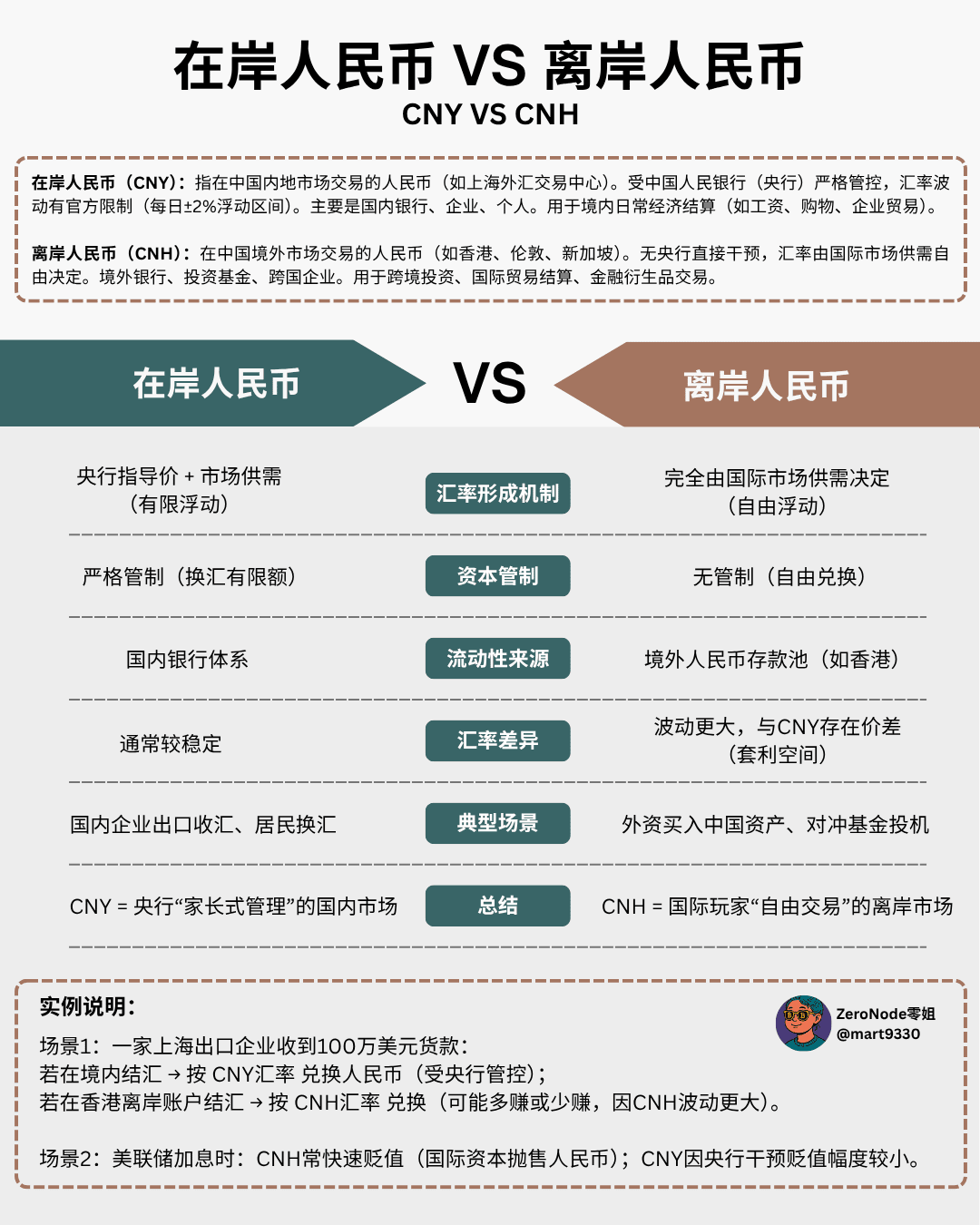When it comes to cross-border payments, offshore renminbi is indispensable. So what exactly is offshore renminbi, and what are its differences from onshore renminbi?
I. What is Offshore Renminbi?
Onshore Renminbi (CNY)
📌Location: Renminbi traded in the mainland Chinese market (e.g., Shanghai Foreign Exchange Trading Center).
📌Regulation: Strictly controlled by the People's Bank of China (central bank), with official limits on exchange rate fluctuations (±2% daily fluctuation range).
📌Participants: Mainly domestic banks, enterprises, and individuals.
📌Usage: For domestic daily economic settlements (such as wages, shopping, corporate trade).
Offshore Renminbi (CNH)
📌Location: Renminbi traded in markets outside China (e.g., Hong Kong, London, Singapore).
📌Regulation: No direct central bank intervention, exchange rate is freely determined by international market supply and demand.
📌Participants: Offshore banks, investment funds, multinational corporations.
📌Usage: For cross-border investments, international trade settlements, and financial derivatives trading.
II. Main Differences

CNY = the 'parental management' domestic market of the central bank | CNH = the 'free trading' offshore market for international players
III. Why Are There Two Markets?
Historical reasons: China's capital account is not fully open, aimed at isolating offshore risks while promoting the internationalization of the yuan, necessitating the establishment of two markets.
Functional Division:
Onshore CNY: Ensures domestic financial stability;
Offshore CNH: Facilitates holding yuan offshore, reducing cross-border transaction costs (e.g., using CNH for 'Belt and Road' projects).
Do other countries have onshore and offshore distinctions:
Countries like India (Indian Rupee), Brazil (Brazilian Real), Malaysia (Malaysian Ringgit), and South Korea (Korean Won) have similar distinctions.
Offshore markets in these countries typically trade through non-deliverable forward (NDF) markets.
Why is there such a distinction? This distinction is usually to control capital flows, protecting the domestic economy from the impacts of international market fluctuations, but the specific effects may vary depending on national policies.
This distinction is quite common in emerging market countries, but the implementation details and effects may be controversial, depending on the global economic environment and domestic policies.
IV. Impact on Ordinary People
💰Currency Exchange:
⚠️Domestic individuals are limited to exchanging the equivalent of $50,000 USD in CNY per year (need to declare the purpose);
👼Offshore can freely exchange through CNH (e.g., Hong Kong bank accounts without restrictions).
Investment:
Use onshore CNY to buy A-shares and domestic financial products;
Use offshore CNH to buy Hong Kong stocks and offshore yuan bonds (such as 'dim sum bonds').
Exchange Rate Fluctuations:
Import companies using CNH for payments need to bear greater exchange rate risks;
Arbitrageurs will take advantage of the price difference between CNY and CNH for profit (e.g., buying currency at a low price when CNH depreciates).
V. Example Explanation
Scenario 1:
A Shanghai export company receives $1 million in payment: if settled domestically → exchange for yuan at CNY rate (subject to central bank control);
If exchanging in a Hong Kong offshore account → exchange at CNH rate (could earn more or less, as CNH is more volatile).
Scenario 2:
When the Federal Reserve raises interest rates: CNH often depreciates rapidly (international capital sells off the yuan);
CNY's depreciation is limited due to central bank intervention.
VI. Future Trends
Narrowing price gap: As the internationalization of the yuan progresses (e.g., cross-border use of digital yuan), the exchange rates of the two markets will gradually converge.
Risk Warning:
CNH exchange rate is more sensitive (prone to international event impacts, such as Sino-US friction);
CNY exchange rate is still mainly 'stabilized' (the central bank has a rich toolbox, such as counter-cyclical factors).
💡 Summary in One Sentence:
CNY is the 'domestic version' of the yuan (safe but restricted), while CNH is the 'international version' of the yuan (free but highly volatile). Both work together to push the yuan into the world, like two wheels of a car.
